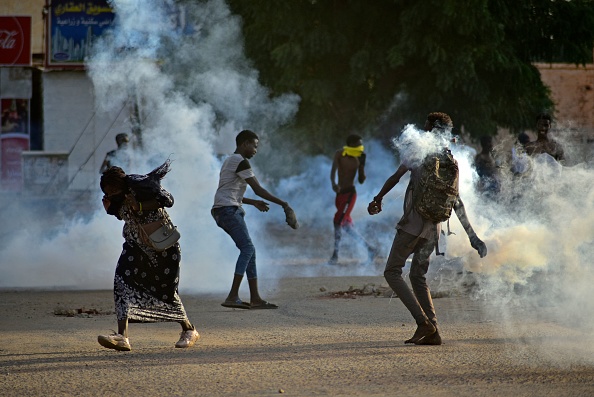Khartoum – Sudanese security forces shot dead at least one protester Saturday in a crackdown on anti-coup demonstrations, medics said, after the military tightened its grip by forming a new ruling council.
The pro-democracy protests come nearly three weeks after top general Abdel Fattah al-Burhan ousted the government, detained the civilian leadership and declared a state of emergency.
“One protester was killed in Omdurman by the bullets of the putschist military council,” the Central Committee for Sudanese Doctors said in a statement referring to security forces.
Other demonstrators in Khartoum’s twin city were wounded by “live rounds”, it added.
An AFP correspondent reported hearing the sound of gunfire as well at a protest in east Khartoum.
ALSO READ | Sudan general names council for post-coup transition
Tear gas was also fired at many protests in Khartoum and neighbouring cities as security forces sought to disperse the demonstrations, witnesses and an AFP correspondent there said.
“No, no to military rule”, “Civilian (rule) is the people’s choice”, and “Down with the entire council”, the protesters in southern Khartoum shouted.
Thousands rallied nationwide, with protests taking place in the cities of Atbara, Wad Madani as well as in the central state of North Kordofan and in Port Sudan city and Kassala state, witnesses said.
The military’s October 25 takeover drew widespread international condemnation, as did a deadly crackdown on street demonstrations by people demanding it restore the country’s democratic transition.
Any hopes the demonstrators had that the military would back down were dashed Thursday, when Burhan named himself as the head of a new ruling Sovereign Council that excludes the country’s main civilian bloc, triggering more condemnation from the West.
Call for restraint
The protests occurred despite the heavy presence of military, police and paramilitary forces in Khartoum, where bridges connecting the capital to neighbouring cities were sealed off, AFP correspondents reported.
The security forces also blocked roads in Khartoum leading to the army headquarters, the site of a 2019 mass sit-in that led to the ouster of autocratic president Omar al-Bashir.
The United Nations has called on the security forces to refrain from violence, which since the coup has already left dead at least 16 people, according to an independent union of medics.
“I once again call upon the security forces to exercise utmost restraint and respect the right to peaceful assembly and freedom of expression,” said UN Special Representative for Sudan Volker Perthes.
ALSO READ | Sudan court orders end to internet cut but services still offline
Saturday’s demonstrations have largely been organised by informal groups known as “resistance committees”, which emerged during the 2019 anti-Bashir demonstrations.
The committees have called for multiple protests since the coup and mobilised crowds via text messages as Sudan has largely remained under a rigorous internet outage with phone lines intermittently disrupted.
Demonstrators also blocked roads with brick as they have done at previous rallies.
But despite the efforts, “civilian opposition to the coup has been diffuse and fragmented”, International Crisis Group analyst Jonas Horner has said.
The coup has led to punitive measures by the international community disturbed by the turn away from a transition to full civilian rule.
‘Gravely concerned’
On Friday, military figures and new civilian members of a new ruling council were sworn in before Burhan.
Three former rebel leaders who were members of the ousted Sovereign Council and were appointed to the new one did not attend the ceremony. They had previously rejected the military coup.
The newly named council features several new and little-known figures to represent civilians.
But it excludes any members of the Forces for Freedom and Change (FFC), an umbrella alliance which spearheaded the anti-Bashir protests, and the main bloc calling for a transition to civilian rule.
ALSO READ | Sudan security fires tear gas as anti-coup campaign starts
The UN has criticised the military’s latest “unilateral” step, while Western countries said it “complicates efforts to put Sudan’s democratic transition back on track”.
Burhan insists the military’s move on October 25 “was not a coup” but a push to “rectify the course of the transition” as factional infighting and splits deepened between civilians from the FFC and the military under the now-deposed government.
Follow African Insider on Facebook, Twitter and Instagram
Picture: Getty Images
Source: AFP
For more African news, visit Africaninsider.com


